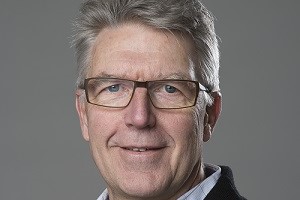Why we must talk about cancer
Meet Professor Lars Holmberg, Uppsala Health Summit Programme Committee Chair 2018

Lars Holmberg, Professor Emeritus, Uppsala University
Lars Holmberg is Professor Emeritus at Uppsala University and King’s College London where he is currently advising research teams on clinical apects of breast, prostate and urinary bladder cancer. Parallel to his academic tenures and until his retirement in 2016, Professor Holmberg was the Director of the Regional Cancer Centre Uppsala/Örebro Region, Uppsala, Sweden.
Throughout his career, Professor Holmberg has contributed extensively to the work of national and international committees and working groups. He is currently leading a Bladder Cancer research project funded by the Swedish Cancer Society.
Professor Holmberg, you have a long history of researching different kinds of cancers while also working clinically and with regional policy development around treatment and care: How has the cancer landscape evolved since you first started practicing medicine as a surgeon in the 1970’s?
Despite few major breakthroughs, there has been very substantial clinical progress in cancer diagnosis and treatment. It is mainly many small steps forward that successively has brought us where we are today with many more cancer survivors than in the 1970´s. At the same time, there are some types of cancers where progress has been very limited, and unfortunately some of these cancers are common globally, including in countries where resources for care and treatment are limited.
Meanwhile, there have been remarkable improvements to health on a population level in many countries, including those with scarce resources. For example, deaths from infectious disesases has declined in many regions of the world. However, when people live longer and smoking and obesity become important risk factors rather than infections, the number of people developing cancer will increase. The prognosis is that by 2030, the number of persons developing cancer and dying from the disease per year will increase from now by 50 % and 60 % respectively. Already now a little more than half of all patients with cancer come from low and middle-income countries and their proportion of the global burden of cancer will increase.
The very positive situation that knowledge and technology in cancer diagnosis and treatment rapidly moves forward, paradoxically creates a dilemma: the potential to help the individual patient increases more rapidly than our resources, creating high demands on effective and equitable use of available resources. This is true globally, but especially so in countries where health care budgets are limited", says Professor Lars Holmberg.
So what can be done?
A lot, but the complex problem we face requires a multi-faceted approach with the involvement of, among others, policy makers, healthcare professionals, scientists and patient advocate groups. We need to work with prevention, promotion of universally accessible health care systems, implementation of national cancer strategies, and to accelerate finding cures in areas where we sofar have not succeeded.
We need an ongoing international dialogue to confront the difficult issues and design ways to make better use of the existing knowledge and pave way for a more equitable access to diagnosis, treatment and care", says Professor Holmberg.
What are your expectations for Uppsala Health Summit?
This is not a traditional research meeting focused on researchers to vet each other´s scientific results. At Uppsala Health Summit, we will engage in a dialogue on how we with a global perspective can maximize front-line knowledge to work for everyone – and how we as rapidly as possible can develop research programmes relevant for the major threats from cancer to population health. These are broad issues which most of us of agree are important, but rarely find an opportunity to discuss. Thus, I have high expectations, both on the dialogue itself and on the outcome", says Holmberg.
Who should take part in the dialogue at Uppsala Health Summit do you think?
I hope it will be a gathering of people who are engaged clinically in diagnosis, treatment and care, and who at the same time have an interest in public health and delivery of existing and new innovations to the population. I also hope that high-level policy makers and civil servants will come along to discuss implementation of anti-cancer strategies with this broad group of researchers and experts from different disciplines. Participation of patients’ advocates and professionals working in health education ranging from promoting healthy life-styles to advocating patients’ rights is very important for the success of the meeting. With this mix, I think Uppsala Health Summit will be a very valuable platform for our dialogue on cancer care", says Professor Lars Holmberg.
